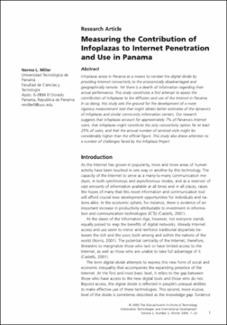Measuring contribution of infoplazas to internet penetration and use in Panama
Abstract
infoplazas arose in Panama as means to combat the digital gap by providing Internet connectivity to the economically disadvantaged and geographically remote. Yet there is a dearth of information regarding their actual performance. This study constitutes a first attempt to assess the contribution of infoplazas to the diffusion and use of the Internet in Panama. In so doing, this study sets the ground for the development of a more rigorous measurement tool that might obtain better estimates of the dynamics of infoplazas and similar community information centers. Our research suggests that infoplazas account for approximately 7% of Panama's Internet users, that infoplazas might constitute the only connectivity option for at least 25% of users, and that the annual number of serviced visits might be considerably higher than the official figure. This study also draws attention to a number of challenges faced by the Infoplaza Project.
